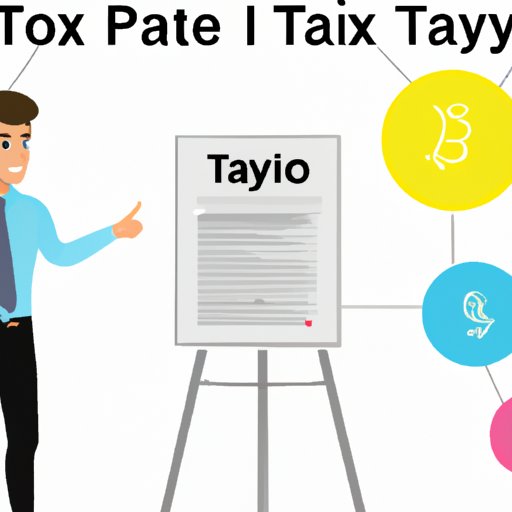Introduction
Cryptocurrency taxation is the process of calculating, filing, and paying taxes on cryptocurrency investments. With the growing popularity of digital currencies, it’s more important than ever for cryptocurrency investors to understand their tax obligations. In this article, we’ll explore the basics of paying taxes with crypto, discuss strategies for minimizing tax liability, and examine the benefits of paying taxes with crypto.

Explaining the Basics of Paying Taxes with Crypto
When it comes to understanding the tax implications of cryptocurrency transactions, it’s important to first familiarize yourself with the common types of crypto transactions. These include buying and selling crypto, exchanging one crypto for another, earning crypto as income, and using crypto to purchase goods or services.
Each of these transactions has different tax implications that must be taken into account when filing taxes. For example, if you buy and sell crypto as an investment, you will need to report any capital gains or losses on your taxes. If you use crypto to purchase goods or services, you may be subject to sales tax. Additionally, if you receive crypto as income, you will need to report it as taxable income.
Detailing the Tax Implications of Crypto Transactions
The first step in determining the tax implications of a crypto transaction is to identify whether or not it is a taxable event. Generally speaking, any activity that results in a gain or profit is considered a taxable event. This includes buying and selling crypto, exchanging one crypto for another, and earning crypto as income.
Once you have identified a taxable event, the next step is to calculate the taxable gain or loss associated with the transaction. This is done by subtracting the cost basis (i.e., the amount originally paid for the crypto) from the fair market value (i.e., the amount received from the sale). The difference between the two amounts is the taxable gain or loss.

Outlining How to Report Crypto Gains and Losses
In the United States, crypto transactions must be reported on IRS Form 8949. This form requires taxpayers to provide detailed information about each taxable event, including the date of the transaction, the type of transaction, the cost basis, and the fair market value. The total of all taxable gains or losses must then be reported on Schedule D of Form 1040.
It’s important to note that many countries have different reporting requirements for crypto transactions. It’s important to research the specific laws and regulations in your country before filing taxes.
Discussing Strategies for Minimizing Tax Liability on Crypto Assets
One of the most effective ways to minimize your tax liability on crypto assets is to take advantage of short-term vs long-term capital gains rules. Short-term capital gains are taxed at the same rate as ordinary income, while long-term capital gains are generally taxed at lower rates. By holding onto your crypto assets for longer periods of time, you can potentially qualify for the lower long-term capital gains rates.
Another strategy for minimizing tax liability is to take advantage of tax loss harvesting. This involves offsetting capital gains with capital losses, which can reduce your taxable income. To do this, you must first identify any crypto assets that have decreased in value since they were purchased. You can then sell these assets to realize a capital loss, which can be used to offset any capital gains.

Examining the Benefits of Paying Taxes with Crypto
Paying taxes with crypto has several advantages over traditional payment methods. One of the biggest benefits is lower transaction costs. Many crypto exchanges offer discounted or even free transaction fees, making it cheaper to pay taxes with crypto than with other forms of payment.
Additionally, crypto payments are much faster and more efficient than traditional payment methods. This means that you can pay your taxes quickly and easily without having to wait for the funds to clear.

Identifying Tax Breaks for Crypto Investors
In addition to the potential for lower transaction costs, there are also several tax breaks available to crypto investors. Depending on your country of residence, you may qualify for certain deductions or credits related to your crypto activities. For example, in the United States, crypto investors can claim deductions for expenses related to mining or trading crypto.
Additionally, some countries offer special tax incentives for crypto investors. For example, Singapore offers a 50% tax break on crypto gains up to S$200,000. It’s important to research the specific tax laws and regulations in your country to see if you qualify for any special tax breaks.
Analyzing the Latest Changes to Tax Laws Affecting Crypto Holders
Cryptocurrency laws and regulations are constantly evolving, so it’s important to stay up to date on the latest changes. This includes changes to tax laws that may affect how you report and pay taxes on your crypto activities. It’s always a good idea to consult a qualified tax professional to ensure that you are compliant with all applicable laws and regulations.
Conclusion
Paying taxes with cryptocurrency can be a complicated process, but understanding the basics and taking advantage of the benefits can help you maximize your profits. From identifying taxable events to taking advantage of tax breaks, there are several strategies you can use to minimize your tax liability. By staying up to date on the latest changes to tax laws, you can ensure that you are compliant with all applicable regulations.
(Note: Is this article not meeting your expectations? Do you have knowledge or insights to share? Unlock new opportunities and expand your reach by joining our authors team. Click Registration to join us and share your expertise with our readers.)
